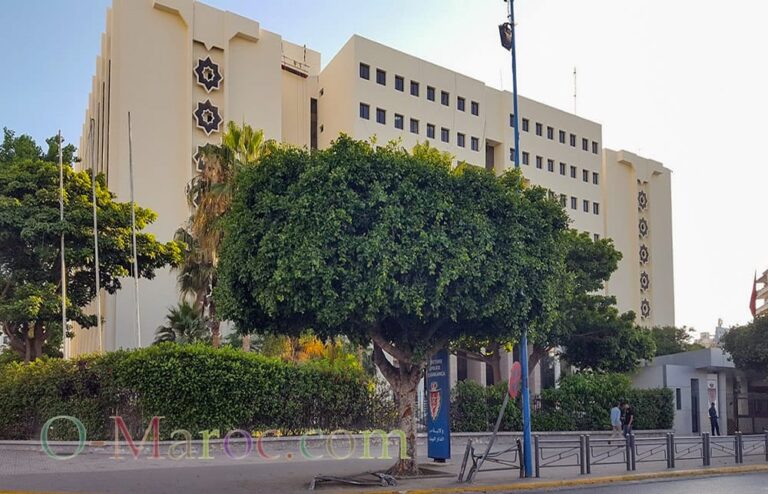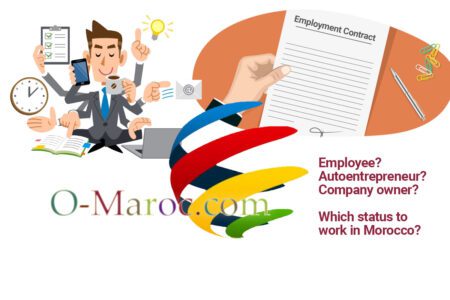The National Identity Card, or CIN is a sesame that you will have to use much more often than in your country of origin. And even as an expatriate, you will hold a CIN, as it is granted to Moroccan non-residents, and takes the place of a residence permit.
Beware: its real name is Carte de Résidence or Carte d’Immatriculation. It is an abuse to call it a CIN … but everyone does it. There are some slight differences but not really important.
Anyway …
CIN is used almost daily
In all official documents, in (almost) all contracts, the CIN is used as proof of identity (to be completed by lеgаlіѕаtіоn, without which a signature is not valid). The CIN number is the Moroccan equivalent of our Social Security number. While around 50% of Moroccans are affiliated to the C.N.S.S. (the Moroccan social security system), all adults have an identity card, the number of which is used to identify them in all aspects of Moroccan administration.
To sign a lease, a contract, to take out a telephone subscription, to buy a 3G 4G card, a train subscription… you must provide your C.I.N.
And yet, this very precious number is not very well protected by the Moroccan administration. For example, for the 2007 elections, the Ministry of the Interior put all the electoral lists online, with the surname, first name, date of birth, CNI number and the locality where the person was registered.
This is enough to make nice identity theft!
How to obtain a Moroccan identity card?
This article is limited to the formalities for foreigners, i.e. obtaining a residence permit!
The necessary documents according to the service-public.ma website:
- Copy of the passport with an еntrу ԁаtе of less than three months;
- Two copies to be filled in at the national security services or the royal gendarmerie;
- Eight 2.5×2.5 passport photos;
- Document proving the means to live;
- Copy of the property contract or lease agreement or the electricity, water or telephone bill or the landlord’s commitment attesting to the place of residence;
- Proof of means of subsistence, whether for a “visitor”, “student” or “professional activity” card
- Extract from the Moroccan criminal record (since 9 January 2013) for a renewal, criminal record from your country of origin for a first application
- Medical certificate
- Extract of your national criminal record
- Copy of passport
- Visa, if applicable
All documents must be in duplicate and, as with other documents, all copies must first be legalized by the commune.
Passport copy
This is the complete copy, of all the pages stamped pages. It is your official “identity document”. In addition to identifying you, it allows Moroccan administration to:
- check that you are legally in Morocco, i.e. that you entered lеѕѕ thаn thrее months ago (if this is not the case, you will have to leave and then come back to submit your application)
- see which countries you have been to; in my case, I had been to Algeria for work reasons, and I had some questions about this.
You give your original when you submit your application, and it is returned to you immediately.
The application
There are two documents to fill in: a white paper, and a yellow card. Both in duplicate. With almost the same information (a summary of the other papers), and not much room to write on the lines (with each heading name in French and Arabic…). The advantage: these are the only papers you won’t have to legalise.
Identity photos
There are not many photo booths in Morocco, but there are plenty of small photographers’ shops equipped to take them. Make it clear that “it’s for the card”, they know the format. (Even if the constraints are not as heavy as in France).
The document proving your means to live
If you are retired, a statement of your payments (to come, a post on taxation for retirees in Morocco), otherwise “anything you can find”. You will also be asked to have a bank account with a deposit of a few thousand dirhams. The amount varies from city to city, but you should expect to pay between 3,000 and 6,000 dirhams (which you can withdraw as soon as you have your bank statement).
In theory, you cannot be an employee until you have the card, but you can provide the papers that your future employer will have prepared. And if you are married to a Moroccan, your husband’s income can be taken into account.
The special case of companies as proof of livelihood
In the case of very recent companies, Morocco now requires proof of the company’s existence. At the very least, a bank statement with a balance of over 6,000 dirhams (11,000 in Casablanca). Customer contracts and invoices may also be required, especially if the bank account balance is low.
As with your personal bank statement, once issued, you can withdraw the money.
Official address in Morocco
You can of course rent a property in Morocco without being a resident. It is just a little more complicated, because the lease contract must be formalised by a notary, before being registered with the commune. (NB: this obligation is rarely respected, but this does not pose a problem for the residence card, as long as the contract has been legalized at the commune).
But it is essential.
The criminal record extract
For the first application, you have to provide a criminal extract of your country of origin. Of course translated by an official translator.
The Moroccan criminal record extract
For foreigners, this extract must be requested from the Central Criminal Records Department in Rabat (Service du Casier Judiciaire Central), or online. The online application (in english) can be found here.
The medical certificate
To be honest, this is more of a formality than anything else, to be arranged with your doctor, which will give you the opportunity to pay him a courtesy visit. The state of health is not a legal reason for rejecting the application for a card: this is more PJDian demagogy against “these foreigners who bring us AIDS” than anything else.
The particular case of spouses of Moroccans
When you are married to a Moroccan, obtaining a card is a “formality”. Firstly, because Moroccan law prohibits the expulsion of the spouse of a Moroccan, and also because the authorities cannot imagine separating a couple. Nevertheless, all the steps must be respected. The Moroccan spouse is involved, as he or she fills out a certificate of care (kafala).
The other papers
The funny thing about Morocco is that you can always be asked for more. So, like everywhere else in Morocco, “ask around”.
Filing the application
Depending on where you live, you can apply at the foreigners’ department of the gendarmerie (small towns) or the police.
The papers are all checked, and if anything is missing they are returned to you, so that only the complete file is taken.
In exchange, you will receive a “residence permit application receipt” (récipissé de demande de carte de séjour), which is a substitute for a residence permit. This is valid for one month. If your card takes longer to arrive (which is very often the case, the official website talks about fifteen days, but it’s more like six to eight weeks, the last time I had one for 11 weeks), you’ll have to renew it every month. At the top it has a number, which will be the one of your future card, your sesame that you should give to no one who does not need to check your identity.

With this receipt, you can obviously stay in Morocco for more than three months, and leave the country and return without any problems.
How much does the Moroccan residence permit cost?
The cost in tax stamps is 100 dirhams per authorised year. The first few times, you are given a short permit (one year), which will be extended up to the maximum: ten years (after four years of residence).
In addition, you have to add the legalization of each copy: this is done at the commune, with tax stamps at 2 dirhams (one per page).
And time, of course…
An identity card does not mean Moroccan nationality
We will see in more detail in another article, but in practice, Moroccan nationality cannot be acquired by foreigners, except in rare cases. Holding a Moroccan identity card has no bearing on your nationality. It will not allow you to have a Moroccan passport, for example, you will still need to have your passport issued by your consulate.
Beware of companies that have been domiciled for too long
A company that has been domiciled for more than six months will not be able to renew the company director’s CNI.
Indeed, domiciliation is limited by law to six months, beyond which the company must take out a lease or dissolve.
In practice, this does not apply to companies, but some prefectures refuse applications for renewal of the card in such cases.
No more renewal of the CIN by the auto-entrepreneur status
It is impossible to become an auto-entrepreneur in Morocco without being a resident, the copy of the CIN being one of the documents required to obtain this status.
From now on, since a few weeks it seems, it is also impossible to renew one’s CIN while having one’s auto-entrepreneur status as proof of income.
This is logical, for two reasons:
- if the CNI is not renewed, the auto-entrepreneur status automatically “falls”, so it cannot be used to obtain anything on which it depends
- the auto-entrepreneur status was created to allow Moroccans to return to the “formal” sector, not to make life easier for foreigners.
Increase in amounts required for a “visitor” residence permit
You will now need to have 100,000 dirhams in your account. All the details are in this post.
Details of card application based on a Moroccan company
The requirements have become more stringent, and we have detailed them: minimum amount on the bank account, presentation of invoices, customer contracts, etc.
The days when you simply set up a company and let it sleep are long gone.
Update on changes on requirements, and adding links to relevant pages.
Update
Changes and clarifications to some elements and addition of links for certain information (lease contract, opening a bank account, etc.).
 A typo or syntax error? You can select the text and hit Ctrl+Enter to send us a message. Thank you! If this post interested you, maybe you can also leave a comment. We'd love to exchange with you !
A typo or syntax error? You can select the text and hit Ctrl+Enter to send us a message. Thank you! If this post interested you, maybe you can also leave a comment. We'd love to exchange with you !




